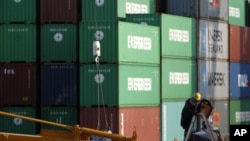Japan has recorded its first trade deficit in more than 30 years and its second-largest ever. That is, in part, a result of the devastating earthquake and tsunami there last year. But economists say other factors are also to blame - and what has happened to Japan's export-dependent economy has lessons for its neighbors.
Japan's Finance Ministry says the country's trade deficit was nearly 2.5 trillion yen - about $32 billion - last year. It is the first time since 1980 Japan has seen the numbers in the red.
Quake, tsunami, other factors
Several factors are involved. They include the damage and recovery costs from the March 11 natural disaster. The recent disruption to the global supply chain from flooding in Thailand also hurt production by Japanese factories that used Thai-made parts. And the high value of the yen slows exports by making products more expensive overseas.
Another challenge comes from Japan shutting down nearly all its nuclear power plants after some reactors suffered meltdowns after being damaged by last year's tsunami.
Martin Schulz, a senior economist at the Fujitsu Research Institute in Tokyo, says that means trade deficits could continue for the world's third-largest economy.
"It's not a one-off. 2012 will be even worse in many terms. Nuclear energy is basically cut out of Japan's grid this year. So Japan will have to import a tremendous amount of energy in terms of gas and oil," he said.
Exporting production
To remain competitive, Japan also is moving manufacturing abroad, where labor and production costs are cheaper.
Economist Schulz says for Asia overall, exports are decreasing because of the global downturn.
"But from Japan, more slowly than others, because it's still capturing the booming businesses in the higher value-added bracket, which is Northern Europe, which is high value-added U.S. While the overall trade coming out of China, cheaper products, this is really taking a hit from the euro crisis and the slow recovery from the U.S.," he said.
Japan's central bank says the country's economy continues to contract, and little growth is forecast for the next fiscal year. The country has suffered a slow and long decline after a burst of unsustainable growth that ended in the early 1990s.
Meanwhile, China has surpassed Japan to become the world's second largest economy. And another of Japan's neighbors and competitors, South Korea, has become one of the top 15 economies.
Need to diversify
But Korea University professor of international economics, Park In-won, says his country must learn from Japan's experience. He says South Korea should develop new leading industries, such as bio-technology and those related to energy, to avoid a similar fate.
"The Japanese economy concentrated on the traditional manufacturing industries for too long a time. To overcome or to not repeat that kind of thing for our economy we should focus more on research and development - develop our leading industries in the future," he said.
China's emergence
Park says both Japan and South Korea must come to terms with China's giant economy, both as competitors and customers.
"It's a kind of double-edged knife. So we have to cooperate in this Northeast Asia region," he said. "In that sense having a Korea-China-Japan free trade agreement would be very beneficial."
But Park and others say the political realities, stemming from territorial and other disputes among the three countries, make achieving a three-way trade pact unlikely in the short term.




